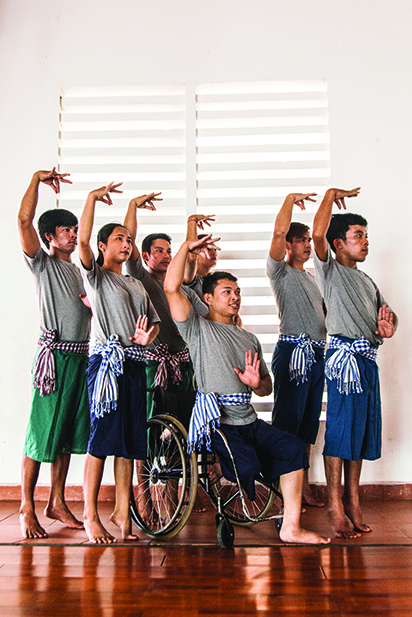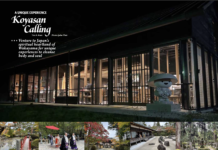
Internationally-touring theatre company Epic Encounters showcases the many talents of performers with disabilities
Text Jennie Pearson
Photos Charlotte Hodges/Photographers Without Borders
To get a drink the way you like it at the Epic Arts Café – a coffee spot amid farms and colonial French architecture in sleepy Kampot town – one can try ordering in sign language from shy, mostly deaf baristas. But it’s for a good cause, of course.
Apart from precious employment for staff with disabilities, coffee sales here fund projects for local non-profit Epic Arts, an organisation looking to give locals a leg up for a career in the arts, in a country with scarce government policies to protect the disadvantaged.

“In our education programmes, we work with young people with learning disabilities because the education system isn’t set up for them, so there is nowhere for a child with Down syndrome to go to school,” explains programme manager Hayley Holden. “It’s a two-year course that focuses on the arts, but it’s much more about them learning about themselves and working out that they can do things: They can dance, they can sing, they can write a song.”
Related:The Serenading Suiters of the Philippines
Cambodia’s environment of near-constant political conflict has resulted in a higher than average trauma and intellectual disability rate among the population. Yet many still ascribe this to misinformed stereotypes about disability, something the organisation is working to remedy.
“When I was growing up, people didn’t call me by my real name. People in my community gave me a new name: Broken Leg,” says ex-student Savun Ley, 21, in a blog post. “I knew I couldn’t do traditional physical work, so I made it my mission to study hard and get good knowledge. I could prove all the mean people wrong, and I would be able to support myself.”

Ley, now a theatre performer with the organisation’s production company, Epic Encounters, adds: “Before, I used to think that I would fall over if I tried to dance – or that my leg would break! Now I’ve graduated from the course, I’m much more confident.”
Like Ley, many Epic Arts graduates get employed by Epic Encounters – the first theatre company in Southeast Asia to feature a fully inclusive cast. The company tours nationally and internationally in countries like the UK, performing productions that use a combination of dance, film and archived footage. Their flagship piece, Come Back Brighter, tells the story of Cambodia’s Khmer Rouge regime and the country’s modern history, while a recent show, Buffalo Boy, is based on the life of an Epic Arts student with cerebral palsy.
Related:Bangkok’s Chinese Heritage May Soon be Bulldozed
Encouragingly, in her three years there, Holden has noticed that audiences of Epic Encounters shows often leave with changed perceptions about disability and what those with disability can achieve. The programme’s success also manifests in other ways: Performers are armed with newfound confidence, and even the initially withdrawn café baristas open up into outgoing, charismatic individuals serving a mean cuppa.
Related:The Religious Roots of Balinese Cockfighting
For more stories and photographs from this issue, see Asian Geographic Issue 131, 2018










